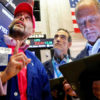
Why the Trump White House might end media sneak peeks for big economic reports
The early peek given to the news media for sensitive U.S. government reports on the economy such as monthly employment and inflation data is under scrutiny again and could eventually be done away with entirely.
Critics of the so-called “lockups” in which the media is given a chance to analyze the data ahead of a set publication time, say it’s about time. They argue a handful of media organizations gain an unfair advantage, using their early access to package the economic data in a way that profits financial traders who subscribe to their service.
“Don’t privilege anyone above anyone else,” said Erica Groshen, former commissioner of the Bureau of Labor Statistics in the Obama administration. “Everyone should have equal access.”
Bloomberg News on Tuesday reported the U.S. Labor Department might restrict the media’s access to critical government economic reports, reviving a proposal first made under the Obama administration.
Such a shake up would spawn the biggest change since the mid-1980s in how market-moving information is distributed to investors and the public.
Lockups are held for major economic reports in a tightly secured, windowless room in the Labor Department in Washington. After mobile phones are surrendered to security guards and computers are disconnected from the internet, reporters are granted up to one hour in advance of a publication time to read the reports, write news articles and put the data in context. When the publication embargo ends, they file stories to their websites and publishers immediately and at the same time as the government makes the data available to the general public via its own websites.
“The original purpose of the lockups made sense,” said ex-Bureau of Labor Statistics Commissioner Keith Hall. “Let reporters see the data and ask questions. Encourage them to get their stories right and not make mistakes.”
Alarms about the use of lockups began to sound early in the Obama administration amid an “arms race” in high-speed trading in financial markets and several security breaches at the Labor Department. Worried about high-speed traders getting an edge, the Obama White House tightened the rules for lockups and considered ending them entirely.
A 2014 report by the Labor Department’s Inspector General indicated some traders paid hundreds of thousands of dollars a year in fees to news agencies that provided them data “formatted for computerized algorithmic trading.”
MarketWatch flashback: Lockups for key economic data questioned
Yet even after the Obama-era changes, Wall Street pros say some high-speed traders still probably gain an unfair advantage.
Even getting the data just a few milliseconds faster can give them a chance to “game the system,” said Gregory Daco, chief economist of Oxford Economics.
What’s far from clear is whether directly releasing the data to the Internet would result in a more level playing field.
Some banks and hedge funds already spend heavily on computer programs to scrape data from government websites immediately on publication and when thousands of banks and funds around the world are “pinging” or accessing government websites simultaneously the fastest software will gain an advantage anyway and sometimes crash the website.
Still, many former government officials contend it would be better to directly release the data to the public via departmental websites. They say lockups are costly to operate for agencies running on tight budgets and that advances in technology make it easier to do.
But one reason why the Obama administration retained lockups was because of frequent delays in how long it took agencies to post economic reports to the Internet.
The bandwidth issues now appear to be a thing of the past though. Labor upgraded its “cloud” capabilities years ago, Groshen said, and the department can upload economic reports immediately.
The end of media lockups at the U.S. Agriculture Department in 2018 might be a template. The department scaled back its data release procedures with no evident ill effects, said Katherine Smith Evans, former administrator of the agency’s economic research service.
“Agricultural news media learned to interpret quickly and get the news out quickly,” she said. “There’s more guaranty of integrity and less risk of people gaining an advantage.”
Daco of Oxford Economics also doubts the end of lockups would be a “game changer.” It might slow down how investors interpret economic data, but he said it wouldn’t have a big impact overall.
Hall, for his part, thinks lockups still serve a purpose though.
“I think there is real value in having reporters talk to the people who put the data together,” he said. “It would be throwing out the baby with the bath water to just end the lockup.”
Asked about potential changes, Labor Department staffers who run the lockups referred reporters to senior officials. They did not immediately return messages.
The lack of response has raised questions about the motives of the Trump White House.
“The Obama administration was worried about high-speed trading. This administration seems much less concerned with that,” Daco said. “In the grand scheme of things I don’t understand why there is a desire by the Trump White House to do this.”

















